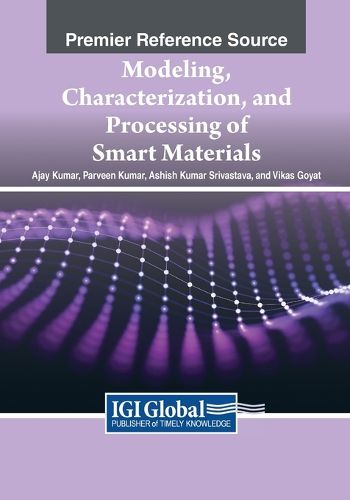Readings Newsletter
Become a Readings Member to make your shopping experience even easier.
Sign in or sign up for free!
You’re not far away from qualifying for FREE standard shipping within Australia
You’ve qualified for FREE standard shipping within Australia
The cart is loading…






This title is printed to order. This book may have been self-published. If so, we cannot guarantee the quality of the content. In the main most books will have gone through the editing process however some may not. We therefore suggest that you be aware of this before ordering this book. If in doubt check either the author or publisher’s details as we are unable to accept any returns unless they are faulty. Please contact us if you have any questions.
The development, processing, and applications of smart materials presents many challenges, including performance correlations to the nature of their reinforcement and the sustainability of such materials through their recyclability, durability, and reparability. Experts have identified the challenge of achieving sustainable development and in this book highlight how smart materials can provide a solution to the problem. It emphasizes the multidisciplinary nature of smart materials and their potential for enhancing product functionalities and capabilities in different sectors, including the biomedical, pharmaceutical, aerospace, construction, automotive, and food industries. Modeling, Characterization, and Processing of Smart Materials proposes a comprehensive guide to addressing the challenges associated with smart materials, including the need for optimization and sustainability, and provides various nature-inspired algorithms, computational and simulation approaches, and artificial intelligence-based strategies for developing innovative smart materials. It also presents potential solutions for the limitations of smart materials and emphasizes the role of Industry 4.0 in maintaining their sustainability. Overall, this book offers a valuable problem-solution perspective on the development and applications of smart materials, making it an essential reference guide for academic researchers and industrial engineers in the fields of material science, chemical engineering, and environmental engineering.
$9.00 standard shipping within Australia
FREE standard shipping within Australia for orders over $100.00
Express & International shipping calculated at checkout
This title is printed to order. This book may have been self-published. If so, we cannot guarantee the quality of the content. In the main most books will have gone through the editing process however some may not. We therefore suggest that you be aware of this before ordering this book. If in doubt check either the author or publisher’s details as we are unable to accept any returns unless they are faulty. Please contact us if you have any questions.
The development, processing, and applications of smart materials presents many challenges, including performance correlations to the nature of their reinforcement and the sustainability of such materials through their recyclability, durability, and reparability. Experts have identified the challenge of achieving sustainable development and in this book highlight how smart materials can provide a solution to the problem. It emphasizes the multidisciplinary nature of smart materials and their potential for enhancing product functionalities and capabilities in different sectors, including the biomedical, pharmaceutical, aerospace, construction, automotive, and food industries. Modeling, Characterization, and Processing of Smart Materials proposes a comprehensive guide to addressing the challenges associated with smart materials, including the need for optimization and sustainability, and provides various nature-inspired algorithms, computational and simulation approaches, and artificial intelligence-based strategies for developing innovative smart materials. It also presents potential solutions for the limitations of smart materials and emphasizes the role of Industry 4.0 in maintaining their sustainability. Overall, this book offers a valuable problem-solution perspective on the development and applications of smart materials, making it an essential reference guide for academic researchers and industrial engineers in the fields of material science, chemical engineering, and environmental engineering.